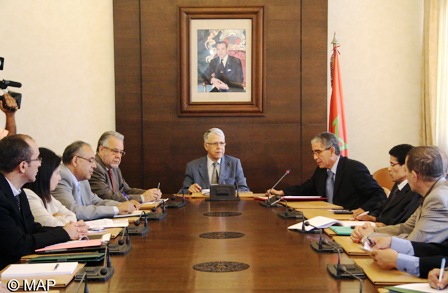Citizenship Platform Committee presents the 1st phase of its plan of action to the Prime Minister
The Steering Committee of the citizenship platform for the promotion of human rights culture (platform), chaired by Mr. Ahmed Herzenni, President of the Advisory Council on Human Rights (CCDH), held a meeting with Prime Minister Abass El Fassi, to present the suggested main lines of the first phase in its plan of action, on September 8th, 2010, in the Prime Minister’s office, in Rabat.
On this occasion, Mr. Herzenni explained that the committee developed a plan of action to implement the platform in three phases (preparation, implementation and assessment). He presented four main activities, listed among the activities of the preparation phase, relative to training, awareness and education:
• Preparing a reference guide relative to the promotion of human rights culture;
• Raising awareness about and widely publicizing the platform;
• Organizing a national forum with regional aspects on human rights where human rights stakeholders and players share their experiences, expertise and best practices. This forum will be recognition for the efforts made to protect and promote human rights, especially in remote areas;
• Encouraging the training of trainers in the field of human rights and making universities participate to achieve this aim.
The Prime Minister praised the work of the committee and highlighted the importance of the suggested plan. He emphasized the importance of awareness and indicated that this process should be regular in time. He also underlined the role of political parties and unions in the promotion and protection of human rights and called for their participation in this process, reiterating their role in supervising and raising awareness of citizens in the field of human rights.
The platform steering committee suggests the following phases:
• Preparation phase (expected to last one year - 2011). It aims, mainly, to: prepare a reference guide to promote human rights culture, publicize and raise awareness about the platform and its importance, organize an annual human rights forum and encourage the training of trainers in the field of human rights;
• Implementation phase (2012-2014). Three main lines to deal with in this phase:
Training: working following the academic training approach in the field of human rights and training officials in charge of the application of law;
Awareness: relying on creativity and media through different forms, theatre, cinema and media;
Education: developing programs relative to human rights education and providing the necessary educational supports;
• Assessment phase. In this phase results, suggestions and recommendations will be evaluated to overcome the difficulties and strengthen the achievements.
The Platform aims to give a momentum to mobilize governmental and non-governmental stakeholders to coordinate and integrate all activities promoting human rights culture in relation to a comprehensive, consistent and permanent vision. This vision aims to meet a societal objective, uphold and solidify the values of human rights in society and encourage citizen to adopt them. The Platform identified three levels of intervention, namely education, training and awareness.
The platform’s official installation ceremony was held on February 26th, 2007 in Rabat. The steering committee in charge of the following-up and implementation of the platform, composed of representatives of governmental and public institutions, including the Advisory Council on Human Rights and the representatives of the university, media and civil society, was appointed on October 28th, 2009.






















